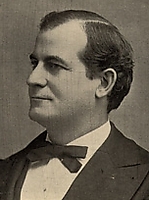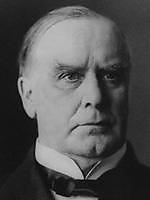 |
[Blog Home Page] |
| Chronicler's Minutiae | ||||||||||||
|
The Candidates' Election Day - 1896 Posted September 07, 2020 at 10:00am by Chronicler This is the first installment of a project I hope to finish this year, in which I provide details about what the presidential nominees were doing on the day of their presidential election. The research will be obviously based on newspaper articles, which carry their own biases and may contain early reports that were later corrected but not captured in these summaries. I originally planned to begin with 1900, but since the two primary nominees that year had also been the primary candidates in 1896, I decided to begin with that year. Because the newspapers generally provided more detail about what the winners were doing, I will start with the candidates who placed second (sometimes those who placed further back). I will attempt to provide information on all candidates who received electoral votes, and if I can find information about other candidates, they will also be included. === Election of 11/3/1896 ===  William Jennings Bryan (Democratic, Populist, Silver Republican Parties) Bryan and his wife spent the night before election day in the Paxton Hotel in Omaha, Nebraska, where he had held a rally the previous day. A reporter knocked on the hotel door early in the morning to ask when they would be leaving to go home. The reporter described Bryan's voice as "husky" from his many speeches; the candidate reported he had "a refreshing sleep and that he felt well." He purchased some newspapers that he read while he and his wife had breakfast. They caught the train at 8:30, and the train arrived in the Lincoln station at 10:15 am. A band was waiting for him and played "Home, Sweet Home" while a large gathering of farmers called the "Bryan Home Guards" cheered and then followed Bryan's carriage through the streets. Bryan's first item of business was somewhat interesting. He had moved in the past two years and forgot to register to vote in his new precinct. He went to the county court house to "secure a certificate of citizenship," which included an oath about the legitimacy of the information about his residence. He then went to his polling place, which was the fire engine house in precinct A of the fifth ward, on F Street near Fourteenth. He retrieved his ballot and went into the polling booth. A poll worker then recommended "As a mark of respect to your fellow citizens, we all take off our hats." The poll workers all removed their hats for Bryan. After voting, he brought his ballot to the ballot box. The poll worker standing there guarding the box jokingly asked him "Are you sure you have got the right [presidential] Electors?" Bryan shook the man's hand and had to weave his way through the voters and reporters standing outside. His carriage took him home. Upon reaching his home, the Bryan Home Guard had formed a line along the sidewalk leading to his house. About a thousand people were in his front lawn at that time; the band again played "Home, Sweet Home" for him. Increasingly hoarse, Bryan made a few comments, including a complaint that the Palmer Electors were placed before his on the Nebraska ballot. Bryan was a little shaken emotionally by the local support and on a few occasions appeared to be fighting back tears. Among his remarks captured by the news reporters were these: Ladies and Gentlemen, I have done all that I can to secure success in this campaign, and for me there is nothing left but to await the returns. I want to thank the good friends who have been so kind and courteous in my leaving and my returning... We shall abide by the result, whatever it may be." Bryan then went to his home. His sisters had been caring for his three children during his election travels, and they had also planned how he would spend election evening. They installed some private telegraphs in his house to receive news on election night. Bryan's campaign advisors had told him that the early returns would favor McKinley, who would initially appear far in the lead, but that the Bryan precincts would report later and change the result. As a result of this advice, Bryan was not initially alarmed at the Republican sweep of the northeast. DNC Chairman James K. Jones believed that Bryan would win 156 electoral votes in the South and 61 in the West, giving him 217 of the 224 needed to win. Jones believed that Bryan was leading in Maryland, Indiana, and Michigan, any one of which would put Bryan over the top. Based on this analysis, Bryan was unconcerned about the popular vote landslide piling up against him in the northeast. The day after the election did not produce the result Bryan anticipated. He received telegrams on and off during the day, showing that his deficits in key states were increasing. Telegrams were sent to a hotel near his house, and a courier delivered them to him. Bryan attended a funeral of a friend the morning after the election. Around noon Bryan issued a statement saying "... the vote is very close in several of the states and the result cannot be known positively until the entire vote is counted. In all close contests it is wise for both sides to watch the returns to guard against the possibility of mistake, intentional or unintentional." It wasn't until the 5th that Bryan and Jones acknowledged defeat. Bryan greeted visitors that day as he converted the campaign offices in the downstairs rooms of his house back into the parlors that had been there earlier, telling one visitor "there is no need in feeling downcast - the fight has just commenced."  William McKinley (Republican) McKinley was awakened on election day morning by musical bands walking down the streets calling people to vote. The bands began their work at 6 am and contributed to the overall 25% increase in voter participation in Ohio (compared to a 15% increase nationwide). McKinley's brother Abner voted early and went to the candidate's house in Canton to report on the increased turnout. McKinley read an AP press bulletin that the seasonable weather was already prompting a heavy turnout. The owner of the A.B. Chase Company in Norwalk, Ohio (producers of pianos) sent a telegram that his employees went to vote before work and gave McKinley 90% of their vote. A group of supporters named the McKinley Troop called the candidate on the phone around 8 am and asked if they could escort him to the polls. McKinley greeted them outside and left for the polls at 8:30 am. He voted in precinct A of the first ward of Canton. The owner of a factory along the route McKinley walked to vote allowed the working women to wave at him from the various windows in the large brick building. Upon reaching the general store in which he would vote, a dirty workingman in line in front of him offered his place in line. McKinley whispered something to him that made him smile but did not take his place in line. Like Bryan, McKinley voted with an Australian ballot. As he left the store/polling place, the crowd cheered. McKinley and his brother walked to their mother's house nearby for a short visit. Mark Hanna arrived at McKinley's residence around 1 pm. Hanna had been receiving reports from around the nation, and he privately believed that a shift was taking place in Bryan's favor although he told the reporters outside that he was "absolutely confident of the success of the Republican ticket." The day was somewhat difficult for McKinley. Ida McKinley was an invalid, and she was having a bad day. She began to feel better in the evening as telegrams began to demonstrate her husband's runaway win in the northeast. The crowd outside grew all evening. The unexpected string of good news kept the McKinleys up late into the night. Occasional telegraph reports of his margin in various states caused cheers from the crowd outside, which occasionally interrupted the McKinleys' attempt at naps. Finally at 4:15 am some staffers went outside and asked the crowd to go home so the McKinleys could sleep. The day after the election, the McKinleys rose late - at 10 am - but were unexpectedly refreshed given their short sleep. McKinley had allowed his library to become a small campaign headquarters, and staffers informed him that he had won the widest victory since Grant in 1872. His 57% in New York was the highest percentage ever given to a presidential nominee in the state (and wouldn't be surpassed until 1920). He was the first Republican presidential nominee to win Kentucky ever, and the states of New Jersey, Delaware, Maryland, and West Virginia hadn't voted Republican in a presidential election in a generation. The news brought McKinley a great relief, as he had not entirely dismissed Hanna's early warnings about a shift towards Bryan. Although the day after the election was generally rainy, people came in groups of various sizes to offer congratulations. Finally some staffers were appointed to stand at the door to regulate these visits because McKinley needed occasional naps to make up for his lost sleep. It was on the 5th that the final rumors about a Bryan victory ended. A factory owner in Tonawanda, New York, was switching the power source to electricity and had previously agreed with McKinley to have electric wires connected to his house (in Canton, Ohio) to initiate the electric current in the factory. The workers finished installing the wires on the 5th, and McKinley hit a special button at 2:30 to achieve the purpose. The McKinleys, finally sufficiently rested, took a stroll in the rain that day after being cooped up inside the previous day. Although McKinley did not issue a victory statement, he began to assemble his transition team the following day. Bryan sent a congratulatory telegram to McKinley on 11/6, which arrived at the McKinleys' house as they were finishing breakfast. McKinley drafted a response and walked to the local library, which had a telegraph machine, to reply. Third Party Nominees The newspapers didn't run much information on the minor candidates of 1896. Palmer gave a speech in his home town the day before the election, and Levering told a reporter that the election would be a major victory for sound money, but otherwise newspapers were generally silent about them. Sources: Akron Beacon Journal, 11/3-6/1896; Parsons [Kansas] Palladium, 11/4/1896; Pittsburgh Daily Post, 11/5/1896; Lincoln Evening Call, 11/5-6/1896
|
. | ||||||||||